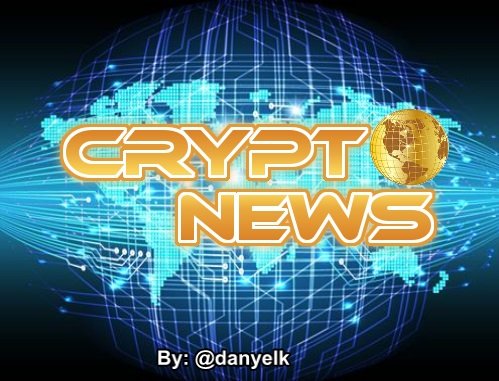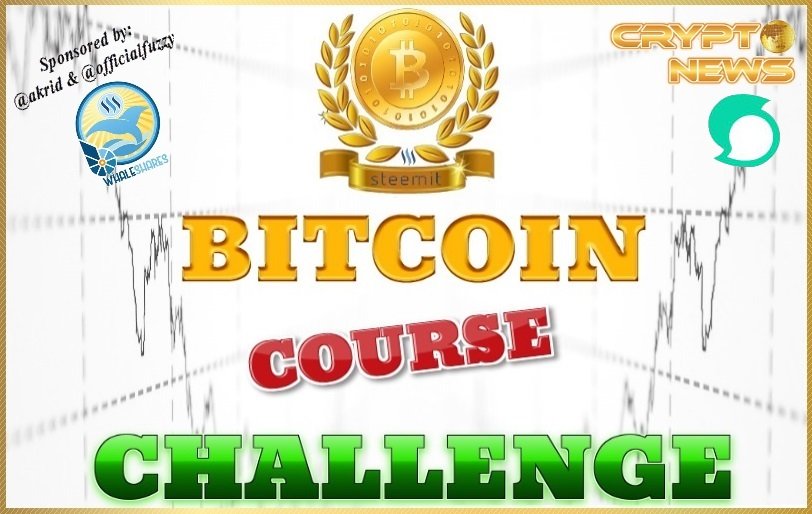
- The 10 Biggest Myths about Cryptocurrencies - Part 6!
- Android: 90% of all Crypto Apps vulnerable to Hackers!
- IOTA opens Data Marketplace!
- BBVA tests Data Transfer on Waves!
- Wallet App ABRA will also support Ether in the Future!
- AlphaPoint: New CEO and New Blockchain Project!
- Nasdaq announces Bitcoin Futures for mid-2018!
- Bitcoin Course Challenge Week 8



In the series "The 10 Biggest Myths About Cryptocurrencies", I take a closer look at the top 10 claims about cryptocurrencies and their opportunities and risks. In doing so, I will daily explore a new myth and check it for accuracy.
Myth 6: Cryptocurrencies are not attractive to institutional investors
The following text may offend parts of the Bitcoin community. However, even the biggest crypto-romantics will sooner or later have to realize that Bitcoin and other cryptocurrencies have long since become a real investment option for institutional investors.
The central basic idea of Bitcoin as a decentralized peer-to-peer currency has been to reduce the dependence on intermediaries in international money trading, and to make them completely superfluous in its perfect form. This objective also determined the mindset of the early proponents of cryptocurrencies as instruments for institution-independent action. Quite quickly, Bitcoin developed as a symbol for the liberation of institutions and especially financial institutions.
This basic idea was reflected for a long time in the use of Bitcoin again. Thus, it was initially partially used within a slowly growing community as an alternative means of payment. As the use of Bitcoin as a means of payment and the advent of alternative cryptocurrencies (Altcoins) increased the acceptance of this payment method, the exchange value of these currencies also increased. This made cryptocurrencies interesting as an investment case as well - first and foremost from the point of view of the members of the crypto community.
Since then, however, a lot of time has passed. It can now be said that cryptocurrencies have long since been adapted and used by institutional actors. In fact, the crypto market in its current form is no longer so dissimilar to the classic securities market and in many aspects even has advantages over it.
Thus, the tokens now in circulation are a completely new asset class, which as a whole offers a potential for development that is still unparalleled. Thus, the total market capitalization of all crypto currencies so far this year has increased fifteenfold - and the trend is still upward.
Of course, a crypto-invest offers no return guarantee, let alone the security of a multiplication of the invested capital. Paired with an asset mix of traditional investment opportunities such as securities or commodities, cryptocurrencies can help diversify the portfolio. Especially the low correlation to other asset classes makes crypto currencies an anticyclical and robust investment, which in case of doubt can be able to compensate for temporary undesirable developments in other areas.
So it can be said that cryptocurrencies have moved out of the initial clientele corner and have long since arrived in the middle of (investor) society. From the point of view of institutional investors, cryptocurrencies can also be regarded as an attractive way to diversify their money and create opportunities.
Part 1: Cryptocurrencies are mainly used for criminal business such as money laundering.
Part 2: States can not regulate cryptocurrencies and will sooner or later ban them.
Part 3: Cryptocurrencies price rises are a pure bubble formation.
Part 4: The storage of cryptocurrencies is cumbersome and risky.
Part 5: The tax situation for cryptocurrencies is unclear.


High-Tech Bridge security researchers recently reviewed the Google Play Store's most popular crypto apps. The result is worrying because only about 10% of the most used apps for Android smartphones have not failed the test. Most of them have some critical security vulnerabilities, they do not provide enough encryption to their users, or they cause problems with the secure storage of sensitive data. As you can see, choosing the right app is more important than ever.
If you want to manage your wallet with an Android app, you should choose it very carefully. High-Tech Bridge, a global cybersecurity company, recently reviewed apps that were downloaded most frequently on the Google Play Store. The investigation of the software was not manual and thus comparatively superficial, because you only used the self-developed online tool "Mobile X-Ray". Nevertheless, in many cases the diagnosis is catastrophic. The test results are broken down by the number of installations performed.
Of the 30 most popular apps installed more than 500,000 times, 94% have at least three intermediate security vulnerabilities. More than three-quarters (77%) of the apps even have at least two serious security holes. 17% of the top 30 apps are susceptible to man-in-the-middle attacks, where hackers can successfully engage in the transmission of sensitive data in order to tap them. In 66% of the apps, the functionality of the software endangers the privacy of users. 94% of apps use SSLv3 or TLS 1.0 encryption, which has been out of date for years due to lack of security.
Half of the mobile programs even transmit the data with too weak or insufficient encryption and none of the apps is protected against reverse engineering. The term reverse engineering refers to the protection against a reconstruction of the software by unauthorized persons. Cybercriminals can freely reconstruct the source code of the tested crypto apps to discuss how to get the most out of mobile assets with the least amount of overhead.
Ilia Kolochenko, CEO and founder of High-Tech Bridge is not surprised, despite the fatal results. Security researchers have warned the Android developers in the past several times and pointed out that too fast creation of the software is associated with risks. Kolochenko warns that you only see the tip of the iceberg. The most dangerous vulnerabilities are hidden in his opinion not in the apps, but in the programming of the online cryptocurrency trading platforms. There is to get the most money for cybercriminals, which has unfortunately happened again and again in recent months.


Since yesterday you can do more with IOTA than just trade: On the Data Marketplace, sensor data can be bought worldwide for IOTA.
Data is often referred to as the gold or oil of the digital world. No wonder - companies like Facebook, Google or Amazon make a not inconsiderable part of their income with our user data. It is not without reason that Cypherpunks in their manifesto have called for a strengthening of digital privacy - simply because data and personal information are property. A similar point was voiced by William Mougayar in his keynote speech at the Blockchain Innovation Forum congress when he spoke of the three people.
But not only our own data are very valuable; A typical morning ritual of many people is to look at their smartwatches or their smartphones to find out about the current temperature. This is usually recorded and transmitted by a sensor maintained by a meteorological institute.
One idea of the Internet of Things is that of exchanging and trading such data. As part of an inter-machine communication, systems could interact with each other with data. But it could also be very interesting for us humans to get data directly from the sensory end user.
A current problem is that data has a similar fate to money: central institutions often have their hand on that data. This is not just a purely idealistic problem of the form "free data for free people"; The central institutions that host this vast amount of data in so-called data silos unknowingly interpret and filter this data. This means that perhaps knowledge that could have been obtained from a slightly different analysis of this data is lost. For this reason, many in science speak for open data - that the data on which publications are based, are quickly accessible to those interested.
IOTA Data Marketplace - A peer to peer market for sensor data
IOTA has taken an important step forward on this matter: on data.iota.org, various - so far few - sensors can be requested regarding their data. For a query of a weather station in Tel Aviv, which is supervised by IOTA, looks like this then for example:
For a price of 20 cents, which went directly to the data provider, you could look at the development of temperature and light intensity in Tel Aviv.
It is important to emphasize that these 20 cents (which by the way currently do not cost the interested end user anything, because in the current proof-of-concept phase all transactions pass through the testnet) are not a transaction fee. As stated elsewhere, the "transaction fee" in IOTA is the willingness to verify other transactions.

Distributed Ledger Technology: More than just Fintech
Still, this query takes a long time, but the potential is clearly visible. The digital marketplace, built by the IOTA Foundation, shows that Blockchain and Tangle are technologies that are much more than fintech. Bitcoin said "Be Your Own Bank", IOTA says "Be Your Own Data Market".
For this reason, the IOTA Foundation was able to win various big players such as Accenture, Bosch or Fujitsu as cooperation partners. In the future, the Foundation intends to expand this marketplace of data through various events, hoping for community participation.


The Spanish banking giant Banco Bilbao Vizcaya Argentaria (BBVA) has successfully tested a blockchain solution for data transfer from paperless commercial transactions between Europe and Latin America.
Using the Waves platform, BBVA has taken a step toward automating electronic document submission. The data transfer of digitized documents took place between Mexico and Spain. The aim was to reduce the time to transfer, review and authorize cross-border trade. Thanks to the blockchain technology, the bank association managed to shorten an international transaction, which normally takes between 7 and 10 days, to 2.5 hours, according to the press release.
Tuna data transfer with Blockchain
This first transaction was the confirmation of a purchase of 25 tonnes of frozen tuna. This was bought by the Spanish company Frime from Pinsa Congelados of Maztlan in Mexico. The payment was made via a letter of credit, one of the most common payment systems in international trade.
This type of cross-border payment usually requires a large amount of documentation. In the usual approach, many intermediate steps are necessary, which makes the processes prone to error. This danger threatens especially with manually issued checks and documents, which in addition justifies the increased duration of the transactions.
Thanks to the blockchain technology, these processes can be automated and shortened. For example, the technology can make changes or corrections. These can then include all the steps from charging the fish to their arrival at the destination. The trial eventually involved the electronic signature of the documents, the simultaneous distribution of the copies to all parties and the receipt of the documents.
Gadin Ruschin from Wave is pleased:
Waves began serving last year in June. Even the Spanish banking giant has repeatedly dealt with the blockchain technology.


As the company Abra announced in a statement, the Wallet app will also support Ethereum in the future.
This step was announced by the app operator on November 28, 2017 during the Coindesk Consensus in New York. Thus, one can save in the future, the second largest crypto currency, measured by the market capitalization, the app. According to the app's founder, Bill Barhydt, the option to store ether will be available next week. In addition to Bitcoin, other government currencies can be stored on the wallet.
The ability to store ethers will not be the only innovation of the app. Abra's storage capabilities are also expected to improve, allowing multiple currencies to be stored simultaneously on the app.
Bill Barhydt explained:
The app was developed in 2015 through a first round of financing in which $ 12 million was raised. In the future, it should also be able to support transactions that require multiple signatures.
Currently, the app still uses a system in which only one signature is needed. The user must "sign" transactions through his private key. For a system that requires two or more signatures, both the user and the app for a transaction would need to give the green light.
Starting next year, Abra wants to add this feature. It is considered whether the signing for three parties should be introduced. A third party would then be authorized, instead of the user or the app, to sign the transaction.
"It really is a direct response to the needs of users who demand more and better things in the Abra app, and we look forward to providing them with what they want," Barhydt said.


AlphaPoint is a major blockchain software manufacturer in the fintech industry. Now the manufacturer announced at the Consensus Invest conference a new project for the digitization of real assets.
The new network should bear the name "AlphaPoint Public Network" (APN for short). AlphaPoint has made a name for itself in the industry, having previously made some products for Bitcoin Exchanges and also initial Coin Offerings (ICOs).
The new network aims to saturate the demand for the trading of physical assets in digital form. In addition, an ICO will be held for the development of the network in the spring of next year.
The APN, whose development the company announced in a statement today, will use Intel's Software Guard Extensions (SGXs) or other software that can also protect sensitive data (such as private keys in the case of blockchain) from attackers. Already in October, AlphaPoint announced that it was working with Intel on a solution to asset management issues.
The company also shared the name of its new CEO. Salil Donde will be in charge of AlphaPoint's businesses in the future. He previously served as executive vice president for Nasdaq Global Information Services. In 2014, he worked as CEO of startup Lewtan, which conducted business analysis and was sold to Moody's the same year.
In addition to his duties as CEO, he will also join the board.
"The most urgent task for AlphaPoint is to enable our customers to digitize real-world assets and launch new markets. AlphaPoint will develop a new public blockchain platform that will accomplish this task and set a new standard.


The US stock exchange company Nasdaq has announced the launch of crypto-futures until mid-2018.
According to a report by the Wall Street Journal, the company intends to include Bitcoin Futures in its program with Cantor Fitzgerald & Co starting next year. The two financial institutions appear to be responding to the recent break in the $ 10,000 mark. Due to the possibility of futures, stock brokers and similar speculators can (almost) act as usual - instead of only with fiat currencies, but also soon with cryptocurrencies.
Shawn Matters, managing director of the financial company Cantor Fitzgerald & Co., founded in 1945, justified the entry into the crypto business above all economically:
The Futures Exchange has already been approved by the US Commodities and Futures Trading Commission. The regulator has thus paved the way for the entry of big players from the stock exchange sector. With the permission, they lowered the regulatory hurdles for getting started with bitcoin futures to a minimum.
Nasdaq gives impulses
Other major exchanges, such as Nodal Exchange, are also considering the potential to add Bitcoin futures to their regular business. According to John D'agostino, a former board member of Nymex, the number of Bitcoin futures will increase dramatically next year:
Especially the proportion of marketing costs will decrease significantly with the current hype around Bitcoin. In addition, the integration of Bitcoin futures by stock market giant Nasdaq will provide impetus to many other companies. The adaptation of cryptocurrencies probably anchors these further in the mainstream. What impact that has on the course, will show - the assumption that we have to move from the Moon towards Mars, is close.


Don't miss your CHANCE to Win 💰 20 Whaleshares + 40 Hairshares💰 in the 🏆BITCOIN COURSE CHALLENGE Week 8🏆
How and where to participate? Just click HERE!


I wish you all a lovely Thursday!!!
ⓁⓄⓥⒺ & ⓁⒾⒼⒽⓉ
Best regards
@danyelk
.gif)


